
An investment in your health professions education will pay you back many times over your career.
The Financial Aid office at MGH Institute of Health Professions can help you create a comprehensive financing solution for your education. Below, find information about financial aid before, during, and after your education at the IHP; from applying for aid through loan repayment. Our office administers approximately $8 million in scholarships and $50 million in loans annually.
Contact us at financialaid [at] mghihp.edu (financialaid[at]mghihp[dot]edu) and 617-724-6332.






